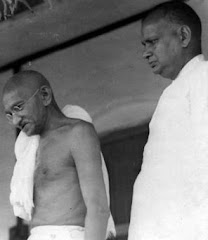Thursday, November 26, was Thanksgiving Day in the U.S. In Palestine it was the day before the Muslim holiday of Eid Al Adha. Eid al Adha, or the Feast of Sacrifice, marks the end of the Hajj, the annual Muslim pilgrimage to Mecca, and also commemorates Abraham’s willingness to sacrifice his son in obedience to God. Traditionally, gifts are given and a cow, goat or sheep is killed and shared with family, friends and the needy. The holiday lasts three or four days, depending on the country. This holiday is akin to Christmas in the United States. (See
http://islam.about.com/od/hajj/a/adha.htm)
Three MPTers and two international guests were preparing a Thanksgiving dinner, when three other invited internationals called to say that Huwwara checkpoint just north of the village of Huwwara, on the main road into Nablus, was closed to outbound traffic. The service they were riding had had to take a back road through Awarta checkpoint. Between the extra holiday traffic, the detour and the heightened security at Awarta, what should have been a 15 minute trip from Nablus to Huwwara had taken over an hour. MPTers were also told that there were two army jeeps on the main road in the center of Huwwara. The three MPTers and two guests went to observe what was happening at the town intersection, while the other internationals continued back to observe at Huwwara checkpoint.

Approaching Huwwara Checkpoint from Nablus,
photo taken a different day.
Two jeeps were parked on the main road in Huwwara, and the soldiers were directing traffic, an incredible amount of both Palestinian and Israeli cars, the latter a rarity in Huwwara. (Palestinian and Israeli cars can be distinguished by the color of their license plates: green, Palestinian; yellow, Israeli.) It was difficult to tell if the soldiers were facilitating the flow of traffic, which was disrupted by people’s need to take an alternate route from Nablus, or if they were randomly preventing people from continuing south on the main road. At various times, different MPTers perceived the situation differently. The group decided to split with some staying in Huwwara to keep watch on the soldiers’ activities and the rest going up to Huwwara checkpoint, from where the internationals had called to say that settler youth were attacking Palestinian cars.
The group arrived to discover many Palestinian cars pulled off alongside the road, hoping the checkpoint would open to allow them into Nablus. MPTers were told by Palestinians that the settlers had been throwing stones at Palestinian cars, and this was confirmed by the internationals who also said the settler youth had been banging on Palestinian cars and spitting on the Palestinians. The internationals also said the soldiers were yelling at and pointing their guns at Palestinians who had gotten out of their cars to see what was happening. The MPTers saw a group of 15-20 teenage settlers, both male and female, much closer to the closed checkpoint than the soldiers permitted the internationals (the use of the term internationals will now include MPTers in the remainder of this blog) to position themselves. Upon seeing the influx of internationals, the settler youth started to walk aggressively towards them. The soldiers positioned themselves between the two groups and walked towards the teens, forcing them back to where they had been.
The soldiers then ordered the internationals to move behind one of the jeeps, which they refused to do as they would then have been a considerable distance from the checkpoint, not been able to see events occurring, and not been able to intervene expeditiously should a problem arise. Moreover, as they told the soldiers, they were not the problem and the soldiers should focus on the settler youth and keep them from attacking Palestinians. When asked why the settler teens were not ordered to leave, the soldiers gave no clear answer but said Israeli police would be arriving with a van to take them back to the settlement. Eventually the Israeli police arrived but the teens were not ordered onto the van. At times the soldiers’ aggressiveness seemed more aimed at the internationals than at the settler youth, as though they had to demonstrate their authority to someone since the settlers enjoy virtual free rein.
About this time the settler teen-age girls started hitting and shoving the soldiers. While the soldiers did at times put out their hands to stop them and push back, it was without any significant force and just enough to get the girls back on the curb. Several of the teens then sat down in the street to force passing cars to veer around them.
 Settler youth sitting in the street in an attempt to block traffic.
Settler youth sitting in the street in an attempt to block traffic.
When the internationals had begun taking pictures, several of the settler youth held up their hands and ordered “No pictures.” They were ignored. Later, one of the young men came over to talk to some of the internationals. He said among other things that his parents are both from the United States, that Israel does not need any money from the United States, that he does not care about international law concerning the illegality of settlements, and that all the land belongs to the Jews. He related what he would like to do to Arabs if he had a knife and the opportunity, while calling all Arabs a word that does not bear repeating.
 The young man who told internationals not to take pictures.
The young man who told internationals not to take pictures.When the checkpoint re-opened, Nablus-bound traffic slowed as it passed the police jeep in the road. A group of about seven teenage settler girls stood at that point, yelling at and kicking passing cars. The soldiers and police made only occasional attempts to stop them. The internationals stood maybe twenty yards away, taking pictures and filming. A little later the settlers started towards the internationals, yelling at them in Hebrew. The soldiers finally came and directed them back.
 Young settler women standing where cars slowed down in order to pass the police jeep, a good location for kicking the cars.
Young settler women standing where cars slowed down in order to pass the police jeep, a good location for kicking the cars.After about three hours, the settler youth began hitching rides to their settlement, and left the area in small groups. When most of them were gone, most of the internationals left as well, with two of the men staying to see the last of the settlers leave. Unfortunately, the military and police also left, and the remaining two internationals later said they had been shoved by the remaining youth, called names – gay, Nazi, anarchist -- and threatened with death.
It seems probable that the closed checkpoint was timed to disrupt the Palestinian holiday, just another of the many harassments and humiliations that accompany the Occupation. A Palestinian activist who had gone from Bethlehem to Jenin early Thursday seemed to confirm this supposition as he found the road closed when he went to return home. MPTers also read about other checkpoint closures and delays on that day. Moreover, on the last day of the three day celebration, the Qalandia checkpoint to Jerusalem was closed for a time, creating a terrible backup of traffic as Palestinians were making their way home.
It’s not uncommon for Israeli soldiers and police to at least allow if not also participate in settler violence against Palestinians. The MPTers heard speculation that the settlers were angry about Netanyahu’s recent announcement of a ten month partial settlement freeze. It should be noted that this freeze will only affect new settlement homes in the West Bank. Public buildings, homes and buildings already under construction, and settler homes in East Jerusalem will continue to be built (see
http://www.haaretz.com/hasen/spages/1130636.html).
As the MPTers and their international guests finally gathered for a very late Thanksgiving dinner, they reflected on what would happen to Palestinian youth who tried similar tactics. Undoubtedly, they would be beaten, arrested, possibly shot. The evening’s events also raised the question: What are the consequences for the future of Israeli society when its settler youth can flaunt their arrogance and disdain with such impunity?












